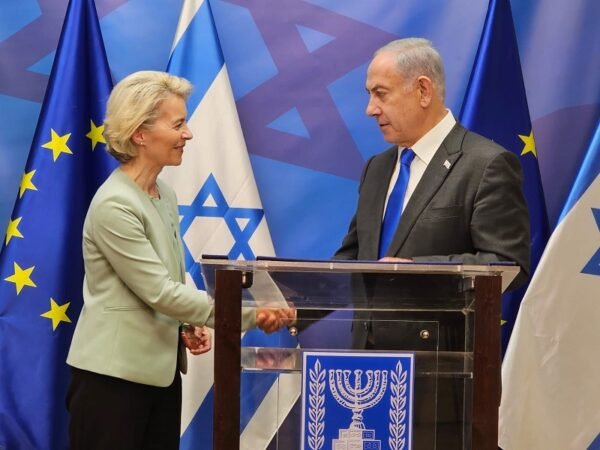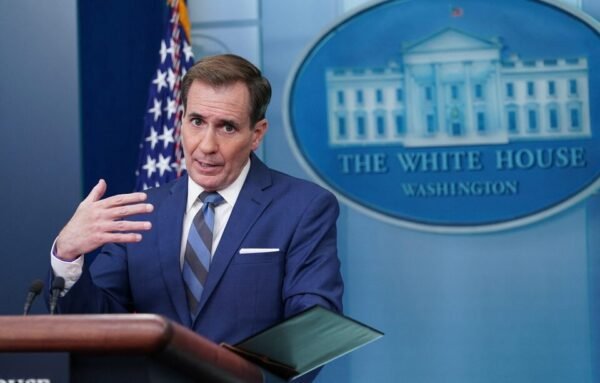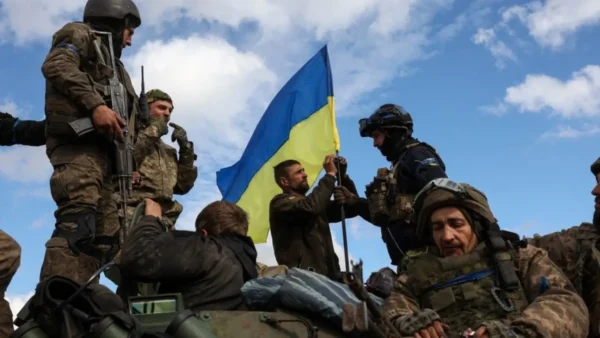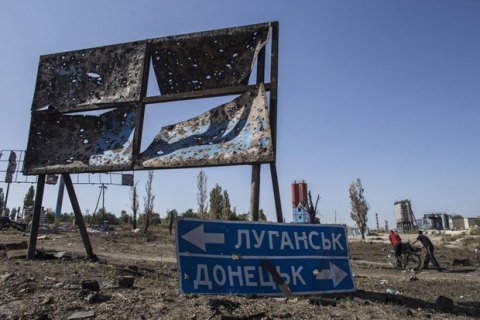“Should I stay or should I go?” is more than a mere lyric from The Clash’s song that has now gone viral on TikTok as teens continue romanticizing the pop culture of the ’80s. However, it embodies the question haunting Ukrainians since 2014.
Since Russia’s large-scale invasion of Ukraine, the world has cascaded into a domino effect with the conflicts brewing in the Middle East. Once again, the West has failed to adequately condemn Israel’s actions. Not only has Israel orchestrated a systematic massacre of civilians in Palestine and continues to defy ICJ ruling to put an end to the genocide in Gaza, but it has also conducted a deadly assault on the Iranian consulate in Damascus in the name of Israeli security. Yet, the West remains oblivious to the reality of Israel’s continuous actions eroding democratic and liberal values, mirroring cruel tactics of the anti-Western axis: Russia and Iran.

The European Union is trapped in a looming credibility crisis and continues to entrench in it. Ursula von der Leyen’s statement on the 14th of April, 2024 following Israel’s deadly attack on the Iranian consulate reflects the deep-rooted contradiction of the EU’s current foreign policy. “We express our solidarity and support to the people of Israel and reaffirm our unshakable commitment towards its security,” Ursula von der Leyen announced, and later on proceeded to affirm the humanitarian crisis in Palestine failing to address Israel’s responsibility for the suffering happening in the Gaza strip. In that same address, Ursula von der Leyen stated, “We also discussed the need to end the crisis in Gaza as soon as possible. This includes an immediate ceasefire and the immediate release of all hostages by Hamas. It also includes the increased delivery of humanitarian assistance to Palestinians in need.”
The EU is trying to uphold peace by grappling with already established diplomatic relations, instead the EU is following the laid out route destined to lead to the collapse of the current world order by not taking any definitive initiative. It is grappling with the critical question of defining where their loyalties lie: with the opposition axis of Russia and Iran, or with Israel, once an ally of the West that has now shamelessly betrayed fundamental principles of the Western liberal order. In essence, at the core of this polemic is the question “should I stay or should I go?” – a question with no answer in sight. The inability to answer this question may just become the world’s doom. The question of survival or sacrifice extends beyond innocent civilians’ fears, first echoing through Ukrainian fields and now spreading far into the Middle East.
However, the contradictions, the indecisiveness, and the hypocrisy of the EU is reflected in the public attitude of many Europeans. In January of 2024, a survey conducted by the European Council on Foreign Relations revealed the views of 17 thousand Europeans from twelve EU Member States regarding the war in Ukraine. Most are pessimistic, with only one in ten believing in Ukraine’s victory. Instead, there’s widespread support for a “compromise settlement” to end the conflict. It is easy to consider the drafting of a “compromise settlement” as a pragmatic solution. Indeed, it is easy to believe this distortion of reality when you have never faced the question of, “should I stay or should I go?” No, not in the context of discussing your last toxic relationship, but as a matter of life or death, where neither choice guarantees safety.
Rest assured, many Ukrainians know the feeling of war seeming distant, one feeling untouchable, completely shielded from the direct impact of the war. Back in 2014, when the Russian forces seized control of the Crimean autonomous assembly and proceeded to violently take control of the Donetsk and Luhansk regions of eastern Ukraine (the Donbas), some Ukrainians preferred to avoid the issue. Back in 2014, it was easy to overlook the influx of refugees into the Southern and Western regions of the country, and as a kid even finding it fun to suddenly have almost ten new classmates. Surely, in this situation, your parents had to break the bad news about the cancellation of this year’s annual summer trip to Crimea, but you were sure that everything would come back to normal within a few years.

Caught in the mundane rush of the day-to-day, it was all too easy to turn a blind eye to the struggle of those forcibly stripped of their properties in Crimea for refusing to abandon their Ukrainian identity by exchanging their Ukrainian passports for Russian ones, as well as the families fleeing the conflict in Donbas. Now that you have grown up and you look back, you feel the weight of these bluntly overlooked tragedies. You recall Diana, a classmate who joined you in 6th grade from Donetsk. You ask yourself what Diana meant when she told you that her dad did not move with them to Odesa, nor was he ever coming back. You wonder how you could have missed the quiet despair in Diana’s eyes, and her mother tirelessly working two jobs to keep the family afloat. Only now, you feel the lump in your throat as you realize the anguish of countless other men, who were abducted by the Russian army to be tortured and in the case of continued non-compliance eventually executed.
In 2024, a decade later, evil persists (some things never change). Yet one thing is clear, the same terror can be more or less destructive in different places. When asked about why the US and allies shot down Iranian Shahed-136 drones over Israel but not Ukraine, John Kirby, the current White House National Security Communications Advisor, banally explained, “Different conflicts, different airspace, different threat picture. And the President has been clear since the beginning of the conflict in Ukraine, the United States is not going to be involved in that — that conflict in a combat role.” The US and the EU under-arm Ukraine in fear of provoking Russia. Both the US and the EU fail to articulate a decisive strategy to deter Russia’s war against Ukraine, revealing the end goal: to only de-escalate the situation by offering breadcrumbs of aid for Ukraine, rather than setting Ukraine up for victory. Ironically, this approach has so far only fueled escalation, eroding global peace and undermining the credibility of the West.

Following the coordinated action involving Israel, the US, the UK, France, and Jordan to protect Israel’s airspace, President Volodymyr Zelenskyy commented on X (formerly Twitter): “Shaheds in the skies above Ukraine sound identical to those over the Middle East. The impact of ballistic missiles, if they are not intercepted, is the same everywhere. European skies could have received the same level of protection long ago if Ukraine had received similar full support from its partners in intercepting drones and missiles. Terror must be defeated completely and everywhere, not more in some places and less in others.”
Zelenskyy further elaborated that Israel’s non-membership in NATO meant that Article 5 was not triggered, and so there was no joint action required. Yet, people insist it is different with some experts using practical reasons like Israel’s much smaller territory and the presence of US warships in the Mediterranean during the attack. While Israel is enjoying direct military assistance from Jordan and even Saudi Arabia, Ukraine receives only a fraction of the support it needs for self-defense, as explained by Ben Hodges, former commanding general of US Army Europe and currently a senior advisor to Human Rights first. The only difference between these two conflicts is political will.

The unfolding events signal the incompetence of the West to uphold pledged liberal values equally across the globe: the swift response to threats against Israel’s airspace while Ukraine’s cries for aid go unanswered; the immediate response to threats from Hamas, while Palestinian children are massacred go unpunished. It’s a sobering truth of the selective nature of international relations, where the rights deemed worthy of protection are determined by strategic interests, not moral imperatives. In this reluctance to confront tyranny, the world betrays the sacrifices of the millions who fought against authoritarian regimes. As the world tramples over all individuals striving for freedom, the question stands: “Are you willing to allow evil to go unchallenged?” At its core the question remains: “Should I stay or should I go?”
Meanwhile, last week, Ukraine’s parliament, the Verkhovna Rada, passed another law on military mobilization in hopes to increase the number of its troops. Before, the law also contained a provision on the demobilization of those currently serving in the army – a measure that promised the long-awaited reunion of thousands families discarded with a few taps of a keyboard because of insufficient political will to defend the European skies of a nation innocent of perpetuating terror, innocent of committing atrocious crimes of rape and torture. General Yuriy Sodol explains that Ukrainian forces have been depleting after more than 2-year long callous war with Russian forces outnumbering Ukrainian armed forces tenfold on the battlefield in the East.
Without a clear declaration from the US and EU on their strategic interest to aid Ukraine’s victory, it will never be possible to organize a collective war effort and secure successful overthrow of anti-Western axis of Russia and Iran. The efforts to undermine threats posed by Russia, Iran, China, and North Korea are all linked, making the prioritization to defeat Russia in Ukraine a logical priority for the West. So when will Ukrainian people suffer enough to be deemed worthy of protection? When will Ukrainians be spared of the question of “should I stay or should I go”?
One day, you will face this very question and understand the harsh reality that foreign missiles do indeed hold lives captive. They scream so loudly convincing you that your country, your people, are beyond saving. Yet, when faced with this question, you will realize that there is a fate worse than war: Defeat. Ernest Hemingway, after volunteering as an ambulance driver with the American Red Cross in World War I in Italy, wrote Farewell to Arms, a book inspired by his first experiences of war. He wrote: “It [the war] would only be worse if we stopped fighting. Defeat is worse. They come after you. They take your home. They take your sisters. They hang you. They come and make you be a soldier again. Not in the auto-ambulance, in the infantry. I think you do not know anything about being conquered and so you think it is not bad.” Accepting a settlement from a terrorist state would not only mean defeat for Ukraine, but it would signal defeat of the liberal world order.

When you are not under threat, you believe nobody would fight unless forced to. But what if fighting is the only means of survival in the face of an endless war like that in Ukraine? How would you feel if your home endured conquest after conquest, with victory remaining always out of reach? How would you feel if your nation would be disregarded and its value diminished?
What would you do? Should you stay or should you go?
Featured image by: The Japan Times




